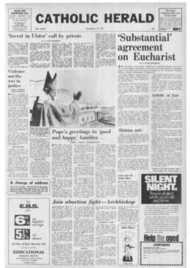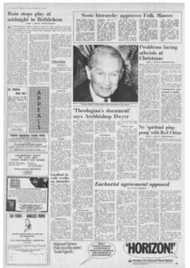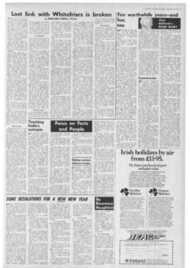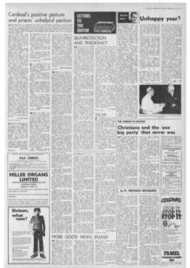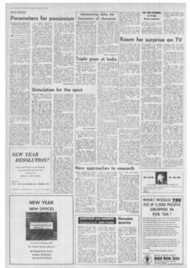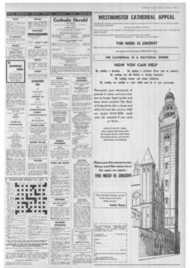Page 2, 31st December 1971
Page 2
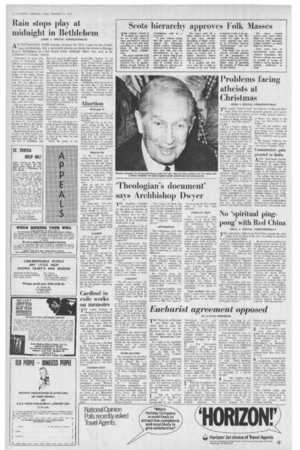
Report an error
Noticed an error on this page?If you've noticed an error in this article please click here to report it.
Tags
Share
Related articles
Call For Study Of Eucharist Statement
Ecumenical Festival Honours Our Lady
Archbishop Dwyer, A Man 'happy In Hope'
'faith' And The Agreed Statement On The Ministry
Archbishop Dwyer's Peace Appeal
'Theologian's document'
says Archbishop Dwyer
THE Anglican Catholic
statement on the Eucharist has been commented on by Archbishop Dwyer of Birmingham and the Rev. J. W. Charley, an Anglican member of the Commission which drew it up.
Archbishop Dwyer is one of the three bishops who make up the Theological Commission of the Conference of Bishops of England and Wales, who will be discussing the document on January 20.
The Archbishop said: "The theologians who drew up this statement deserve our gratitude for the considerable measures of agreement they have achieved. It is not clear, however, that full agreement has been! reached.
"The statement is very much a theologian's document written in difficult theological language. For The ordinary man it raises almost as many questions as it solves.
'VALIANT'
"He will want to know, for example, more clearly and simply how the traditional formulae of the Council of Trent and Vatican II are to be reconciled with the Book of Common Prayer and the 39 Articles.
"It may be that the attempts at such a reconciliation should be by-passed, and instead that new formulae and expressions should be found. In fact the authors of the statement have made a valiant effort to do this. But they will have to find simpler and clearer language if the people are to be convinced that Catholics and Anglicans now share a common faith in the Eucharist.
"Doubtless the authors will explain the statement more fully and clear up obscurities.. The most important thing is that we should use the statement as a starting point for deeper understanding and certainly not for polemics."
'EXHILARATING'
The statement was described as "an exhilarating experience" by Mr. Chancy. He is a lecturer in Theology and Church history, an evangelical Anglican, who is vice-princiipal of St. John's College, Nottingham.
He declared: "The Vatican Council opened an entirely new era" in Church relations.
In a historical and theological commentary accompanying the Commission's statement, published today by Grove Books, Mr. Charley states that "a deep doctrinal divergence lay at the heart of the 16th century division of the Western Church.
"The Council of Trent only confirmed the parting of the ways, but the agreement should cause Roman Catholics to reevaluate the relation between
their current eucharistic theology and that contained in the Council's dogmatic decrees."
DIFFERENCES
The Commission dealt with doctrine, but problems remained concerning eucharistic practice and liturgical forms, said Mr. Charley. He picks out the new eucharistic prayers and Protestant insistence on receiving both bread and wine at Hoiy Communion as points of difference.
"The practice of reservation of the host, so widespread in Roman Catholic circles and also among a minority of Anglicans, is a controversial matter in the Church of England," he adds.
Mr. Charley traces the beginnings of the International Commission to the meeting between Pope Paul and the Archbishop of Canterbury in Rome in 1966.
An Anglican-Catholic joint preparatory commission was set up in 1967 "to evolve a programme for dialogue and cooperation" set out in the Malta Report of 1968. This spoke of "our quest for the full, organic unity of our two .communions."
'HOPEFUL SIGN'
The International Commission was set up in 1909, Anglicans being appointed by the Archbishop of Canterbury, advised by the Lambeth Consultative Body, and Catholics by the Vatican Secretariat for Christian Unity.
It first met in Windsor in January 1970. Representatives chosen came from Australia, South Africa and America as well as Ireland and Britain.
Mr. Charley emphasises that "the statement binds no one bar the signatories" and that its success depends on general acceptance. But "in the opinion of one participant at least, it is a hopeful sign."
The Catholic Information Office issued the following statement about the agreement this week : "Some bishops regard publication of press statements as likely to be misleading. The bishops on both sides are still studying the conclusions of this group of theologians.
"From unofficial first reactions, it seems likely that some bishops will regard 'substantial' agreement as too high a claim."
blog comments powered by Disqus


